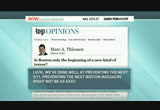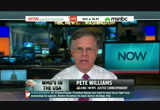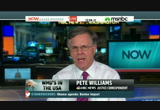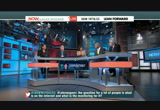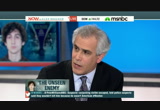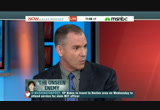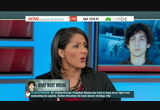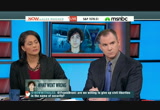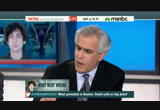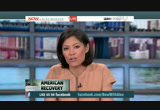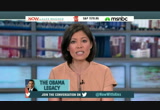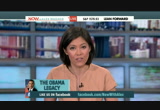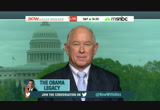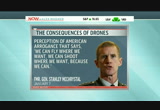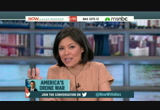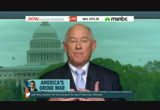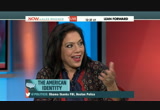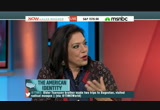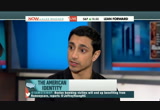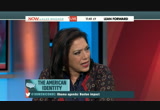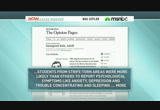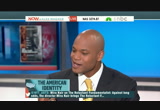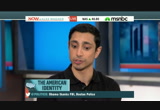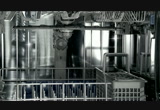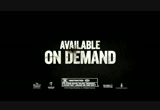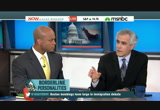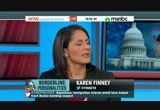tv NOW With Alex Wagner MSNBC April 23, 2013 9:00am-10:00am PDT
9:00 am
ends debate over whether to try him as an enemy combatant. a move supported by republican senators, including lindsay graham. >> i believe our nation is at war, the enemy is radical islam, defined as the taliban, al qaeda and affiliated groups. the question i have regarding this case, is there any association between these two individuals and the groups i just named to allow enemy combatant status to be conferred upon the suspect in boston. >> with no ties to foreign terrorist networks, there would be little difference between tsarnaev and other so-called home-grown and lone wolf terrorists, including timothy mcveigh and ted kosinski. if the tsarnaev brothers were acting alone, the prevention of similar attacks becomes significantly more complex. american law enforcement officials currently track terror networks by tapping into chatter, monitoring videos and reports of field agents, but
9:01 am
even if the fbi is tipped off to potential american terrorists, there's are limits to what can be done. "the new york times" reports that after the tib questioned tamerlan tsarnaev in 2011, officials had quote no authority to watch him because they found no terrorism activity at the time. this scenario that an american could and would do this while flying under the radar raises serious questions regarding national security. the "washington post" writes the boston attacks might serve as a new model for terrorism in the 21st century. seeing how two kids with backpack bombs seem to have succeeded in putting a major u.s. city on lockdown, it may now dawn on al qaeda leaders that a series of small-scale attacks like this conversation the same impact as one spectacular mass casualty attack. through a combination of skill and luck, we've done well at preventing the next 9/11. preventing the next boston massacre might not be as easy. joining me today, former dnc communications director and msnbc host, karen finney, "new york times" op-ed columnist frank bruney, retired army
9:02 am
sergeant wes moore and "mother jones" msnbc political analyst, david corn and msnbc justice correspondent, pete williams. let's talk about the latest on this case. the fact that senator graham is suggesting that the fbi may not have had the tools it needed to effectively get these terrorists before the attacks happened. what are the legal ramifications of this discovery, that the tsarnaev brothers may not have acted in concert with a terrorist network? >> legal ramifications, i can't think of any, policy ramifications, i can. i think that what we're going to see here is a question raised about what should happen when country a contacts the united states and says, we think this person here may be a terrorist. can you please look into that. that would raise one question right there -- should the mere
9:03 am
fact that another government has contacted us about someone, somehow be memorialized somehow in a potential terror database or a watch list. and then question two is, regardless of what the fbi or any other agency finds out in a subsequent investigation here, if that person then goes to country a, should that raise a a warning flag? should that person be questioned? should country a be told, hey, the guy you're asking about is heading your way? there's no system that i know of to do that automatically now. and i guess that's maybe where the policy debate will go with this. because the fbi you know, has a story that seems to satisfy some members of congress, not others. which is -- that when it got this information, it did all that it was legally allowed to do about looking into someone's past. interviewed that person. went back to the russians and said, hey, we're coming up empty
9:04 am
here, what more do you have? and according to the fbi, the russians never responded. >> but pete -- >> go ahead. >> setting aside the russia piece of the equation or the involvement of a foreign country, there's also domestic surveillance and what we do as far as the internet. because the allegedly the tsarnaev brothers learned how to build these bombs on the internet. and i think the question for a lot of people is -- can be what kind of information is on the internet and what kind of monitoring is happening as far as american internet use? >> you now asking me about a debate that this country had going back to the oklahoma city bombing. with the "anarchist's cookbook." there are congressional hearings about this. there was the question of can't we restrict -- some members of congress proposed restricting, shutting down internet sites that post formulas for explosives. and after a long debate, the congress and the justice department and the administration at the time said, you know, unfortunately, there's nothing you can do about that.
9:05 am
it is expression. you know, as distasteful and repugnant as it may be, someone advocating that other people go out and build bombs and here's a way to do it, or just posting maybe should rephrase that. just posting a recipe on here's how you can build a bomb if you wanted to, is protected speech. >> i want to open this up to our panel in new york. david corn, when we talk about the civil liberties question, the first amendment question, these are all things that we sort of tend to turn around and debate in the aftermath of things well not like this, but when there are terrorist plots and questions about national security. to what degree do you think this heightens the -- i don't know, the concern about what is, what is out there as pete says, this is something that was discussed in the wake of oklahoma city. does this change things measurably? >> first, let me congratulate pete. i think there are three petes
9:06 am
out there. >> pete has led the way this past week, he's an american hero. >> i'm grateful for that. in some ways, this case is the harder case. you're talking about not one lone wolf, but two lone wolves, if that's what's happening here. who kind of cooked this up on their own. when that happens within a society with 300 million people, it means almost by definition, they're hard to find. and the only way you can find people like that in some ways is getting into their thoughts and to be very, very intrusive. i kind of think what was the sci-fi movie "minority report" when they could predict who would commit a crime in advance and arrest them beforehand? one of the waz you could reasonably interact with these two lone wolves to be, a year or two years, five years ago, in a way that would have been effective, we can still see if the fbi, if what they're saying is accurate. they took every step they could. every time russia raises a red flag about somebody, i'm not sure i want to give the fbi the tools to sort of go in right there when russia has its own
9:07 am
interests. but at the same time, at the same time, you know, these guys while they managed to send a whole city into lockdown, they didn't accomplish any strategic or tactical means from the perspective of al qaeda. in one way we don't, one way we don't want to overreact as horrific as this were, for the victims that they, that were part of this. >> on the question of how they executed this, pete, in terms of resourcing, there seem to be some questions and peggy noonan raised some in today's "wall street journal," about where these guys were getting the money to buy the instruments with which they made the bombs. to have the lifestyle that they did we know that tamerlan tsarnaev had a fancy car, i think it was a mercedes c class. you know, their parents were in russia, they were divorced, they were not a family of considerable means. do we have any more intelligence on how they might have procured the funds to do all this? >> well that's one of the many questions they'll be looking
9:08 am
into. every time i ask for information like that, somebody always says, that's why we call this an investigation. that's one of the many things they'll be looking at. this he don't have all the answers yet. >> pete williams, american hero and msnbc reporter. the question i have is how much the country will want to see things changed as a response to this kind of the answer we give the country for the horror that's been inflicted on the people of boston. >> i think as we sift through this, the free flow of information will be raised. one thing about the flag raised by russia and what the fbi did. and we're still hashing through whether something went wrong there. i haven't seen how many flags are raised and with what frequency. we're looking at it now and say oh my god, we this warning and they looked and turned away. we don't know how routine these warnings are, how many of them
9:09 am
come across the fbi desk. we need to know that before we say they did something wrong here. >> the other thing is the department of homeland security and the fbi have been warning about this exact kind of thing happening for years. everybody is acting like oh my god this just happened. some of these conversations go back to oklahoma city. i went through and read a lot of it where they talk about lone wolf, the smaller military type organizations where it's maybe you know, two or three or four people. so i think if we're going to talk about what needs to change, as we look at the case, i'm so concerned about the nature of the conversation. because what it means to become radicalized, you don't have to be of a foreign background to be radicalized. we had an american citizen, he was from pennsylvania, who became a neo-nazi and then a jihadist. so the psychological process of becoming radicalized and how you track that or monitor that is a much broader question.
9:10 am
>> in this case, the fbi found no signs that he went to russia and he came back and his youtube playlist. >> the older brother, tamerlan. >> we don't know at what point and once it happens, it may -- >> what the phases are that leads someone to become radicalized. there are certain characteristics and again these are characteristics. whether we're talking about some of the islamic jihadist to people who blow up abortion clinics by the way, there are very similar characteristics, if we're going to talk about domestic terrorism, going to talk about this, we need to take a much broader look at it. >> the other thing to remember about this is the idea of soft targets is not a new thing for al qaeda. al qaeda now scratching their head saying i wonder how we can attack soft targets. this has been on their playbook for a decade plus. the other thing we need to celebrate, also, is how exactly we came to a conclusion to this so quickly. it's because of everyday citizens being diligent. people turning in their photos
9:11 am
and videos. making calls and making tips. as we think about the best way, the best way to counter activity, same as why people are fighting overseas, the best way we can get information is by information and intel that came from everyday citizens about things that were about to happen or changes in situations. >> and foiled plots, it's been american citizens on planes taking down terrorists or would-be terrorists. >> or a guy on a times square, who was seen by a person in times square. >> why they do this and to what degree it's important. what were they trying to accomplish? maybe we'll find out more. they had no getaway plan. this was not like an al qaeda operation. which would involve suicide bombers, aimed at high-priority targets and there's a statement that they're trying to make.
9:12 am
this is still a lot different from those type of attacks. >> and because it's different and also there are two, there are two suspects here. one is deceased. and one seems to have to have have been based on the evidence we've seen so far, been more radical in terms of having more of a jihadist mentality. the 19-year-old, the one who is still alive, dzhokhar tsarnaev, seems to have been less, i think ideologic ideological, if you will. based on the evidence that we have. and i wonder, frank, there's this idea of mercy in american society. and the "boston herald" in today's paper writes we know he's 19 years old, we don't think he has a criminal record. there are a lot of people out there who seem to have warm, positive things to say about him. to predict he'll get a life sentence is not unreasonable. there are democrats who have said, republicans and democrats who have called for capital punishment in this case. there's a question of whether giving him a lesser sentence, if he does cooperate with
9:13 am
authorities, given who he is and how young he is. >> the lesser sentence being life. >> life isn't much of a lesser sentence. it's a pretty satisfying punishment. you know, there's nothing that we can ever do that will, that will make us feel any better about what happened. death penalty versus life -- those are very serious, very, very serious punishments. and you know, there's a whole different debate to be had about whether capital punishment is appropriate in and of itself. >> massachusetts bans capital punishment. but it is a federal case. and certainly the debate will be had on this show probably in the next few days. after the break, americans hope for a return to normalcy after the boston bombings. in the age of terror, what is the new normal? we'll talk recovery and self-reflection, next on "now."
9:17 am
the boston marathon bombings and subsequent manhunt have been a test of the american spirit. as we mourn the victims, the four killed and over 264 injured, boston is cause for us to reflect on who we aspire to be as a country. news of dzhokhar tsarnaev's capture on friday night sparked scenes of wild jubilation in watertown as people took to the streets to celebrate the fact that this time the good guys had beaten the bad ones. as much as tsarnaev's capture had signaled to the country that justice might be done, the manhunt's quick conclusion was a reminder not of our victimhood, but of america's incredible power and the responsibility that comes with that. to be the freest country in the world is to abide by the laws that preserve those freedoms.
9:18 am
especially when they are tested. to be a truly equal society. will require much of americans in the coming days and weeks to not bend to the paranoia and fear that make us into them. and as a nation that aims to foster freedom and equality around the around, we should acknowledge that while we mourn the innocent victims of the boston attacks, so, too, should we mourn the individuals in other corners of the world, for whom collateral damage is a way of life. in iraq today, over 30 were killed and a dozen injured. a reminder of the incessant violence that has plagued that country ever since the departure of the last u.s. troops in syria this week, brings talk of a new massacre, killing at least 350, the latest casualties of a conflict in which the number of dead is now rounded up to the nearest thousand. if boston has given america anything, it is a renewed sense of purpose and a chance to strengthen the things that have made us the weakest. dzhokhar tsarnaev will be afforded a civilian trial, a right not granted to the 166
9:19 am
detainees at guantanamo bay, some of whom have been in prison for over 11 years. the rules at gitmo are no longer expanding, due in large part to our counterterrorism strategy of aggressive and largely unreported drone strikes. we have a window in which to discuss these policies and to begin to come to a conclusion about what we think about them and how they are or are not an extension of our american ideals. in the end, this debate, this conversation about who we are, and who we want to be makes us stronger. debate, civil discourse, has been much maligned in recent years, but it's a hallmark of what it means to be an american, to be idealistic and ambitious and also self-critical and questioning. the openness to new ideas and new ways of thinking is why every single day people come to our shores and raise their hands to become like us -- to become american. the events of the past week didn't necessarily make us weaker or stronger, mostly they just showed us who we are, who we've always been.
9:20 am
a country that somehow miraculously, pretty wonderfully, is always determined to be better. [ male announcer ] this is bob, a regular guy with an irregular heartbeat. the usual, bob? not today. [ male announcer ] bob has afib: atrial fibrillation not caused by a heart valve problem, a condition that puts him at greater risk for a stroke. [ gps ] turn left. i don't think so. [ male announcer ] for years, bob took warfarin, and made a monthly trip to the clinic to get his blood tested. but not anymore. bob's doctor recommended a different option: once-a-day xarelto®. xarelto® is the first and only once-a-day prescription blood thinner for patients with afib not caused by a heart valve problem, that doesn't require routine blood monitoring. like warfarin, xarelto® is proven effective to reduce the risk of an afib-related stroke.
9:21 am
there is limited data on how these drugs compare when warfarin is well managed. no routine blood monitoring means bob can spend his extra time however he likes. new zealand! xarelto® is just one pill a day, taken with the evening meal. and with no dietary restrictions, bob can eat the healthy foods he likes. do not stop taking xarelto® rivaroxaban without talking to the doctor who prescribes it for you. stopping may increase your risk of having a stroke. get medical help right away if you develop any signs or symptoms of bleeding, like unusual bruising or tingling. you may have a higher risk of bleeding if you take xarelto® with aspirin products, nsaids or blood thinners. talk to your doctor before taking xarelto® if you currently have abnormal bleeding. xarelto® can cause bleeding, which can be serious, and rarely may lead to death. you are likely to bruise more easily on xarelto®, and it may take longer for bleeding to stop. tell your doctors you are taking xarelto® before any planned medical or dental procedures. before starting xarelto®, tell your doctor
9:22 am
about any conditions, such as kidney, liver or bleeding problems. ready to change your routine? ask your doctor about once-a-day xarelto®. for more information including cost support options, call 1-888-xarelto or visit goxarelto.com. that's not much, you think. except it's 2% every year. go to e-trade and find out how much our advice and guidance costs. spoiler alert: it's low. it's guidance on your terms, not ours. e-trade. less for us. more for you. [ male announcer ] when you wear dentures you may not know it, but your mouth is under attack. food particles infiltrate and bacteria proliferate. ♪ protect your mouth, with fixodent. the adhesive helps create a food seal defense for a clean mouth and kills bacteria for fresh breath. ♪ fixodent, and forget it.
9:23 am
today as the fbi and u.s. security officials grapple with the issue of home-grown terrorism, congress will address a problem of adifferent sort in the war on terror -- drones. since the first drone strike was conducted under george w. bush in october of 2001, nearly 4,000 have been killed in killings operations using drones. in afternoon the senate will hold its first hearing on their use abroad. as a candidate in 2008, barack obama rode to office with sharp criticism of president bush and his anti-terror policies. in the days and years since the first strikes, president obama is estimated to have ordered five times as many drone strikes as the bush administration. and although the strikes have been credited with decimating al qaeda, they've also been executed entirely in secret and without judicial oversite. a policy that differs significantly with what the president has told the american
9:24 am
people. >> i am not somebody who believes that the president has the authority to do whatever he wants or whatever she wants whenever they want, just under the guise of counterterrorism. >> today's hearings will address proposals to increase their transparency. for a president who voted against the wars in iraq and won the nobel peace prize, his policy on drones have come as a surprise to many. the president's hawkishness has not been universal. that was apparent this week when the president ignored calls from gop hawks to hold a suspect of the boston bombings, dzhokhar tsarnaev, as an enemy combatant and said, dzhokhar, an american citizen. will be given full rights and tried in civilian court. yesterday press secretary jay carney made clear where president obama differs from his predecessor. >> he will not be treated as an enemy combatant. we will prosecute this terrorist through our civilian system of justice. under u.s. law, united states
9:25 am
citizens cannot be tried in military commissions. >> historically speaking, foreign policy tends to either stain or illuminate a president's legacy. time will tell which foreign policy position will define the obama years. joining us to discuss from washington is former assistant secretary of state and professor at george washington university, professor pj crowley. professor, thank you for joining us. >> hello. >> pj as we talk about the legacy of the obama doctrine, vis-a-vis our war on terrorists drones. the attacks were motivated to do what they did by the wars in iraq and afghanistan. i'll quote a little bit from that story. the 19-year-old suspect in the boston marathon bombings has told interrogators that the american wars in iraq and afghanistan, motivated he and his brother to carry out the attack. what do you make of that, pj? >> i'm not surprised at all that
9:26 am
has been a motivator for jihadists around the world, particularly the u.s. invasion of iraq in 2003. so this just continues a theme, and it's not even unique to the united states. faisal shazad, the times square bomber, said he was motivated by the ongoing drone campaign in pakistan. >> wes, as someone who has seen combat, we're having our first hearing on drone strikes, which is interesting given how long we've been using them as a terrorism measure. generally stanley mcchrystal told "reuters," the resentment creates created by use of unmanned drones is much greater than appreciated. it issed perception of american arrogan arrogance. >> when we look at what happened in boston, first to show that the crude nature of ieds, one of the things it showed is a, how
9:27 am
easy it is to develop these things as we've seen now for a decade in iraq and afghanistan. i think the other thing it's important to remember that all of these things that happened to reform policy are not done in isolation. whether we're talking about drone strikes, whether we're talking about you know, islamic cartoons, collection of other things, these things are noticed by people around the world. and you know, a perfect example was the past weekend, i was overseas. the number one lead overseas, the number one and the number two lead overseas, was in europe on bbc was first the boston bombings, something is happening outside the united states and the second thing were the drone strikes, this was on the bbc. these things not happening in isolation and it's important to understand that our foreign policy is being interpreted and understood by people well past our own borders. >> what's interesting is that -- >> take it away, david. >> there's a dilemma here. one reason that barack obama and others have turned to drones is because they want to get the ground troops out. and you know, when the troops
9:28 am
are there and they're going door to door and they're going into, and doing sweeps, they're creating enemies and resentment as well. so then they move to the drone strikes and again that shows arrogance and you, we saw the figure, 4,000 people killed. 10% civilian, maybe? or unintended people? hundreds at least who have been killed. and if we're engaging in any sort of military conflict in afghanistan, pakistan region, yemen, or in iraq as we had previously, we get into this position where we're going to tick off a lot of people. and resentiments will build, almost regardless of whether you do it with troops or with drones. but you know, i'm glad that finally we're having a hearing to discuss some of this out in the open. >> and pj, the flip side of this of course, what are the reasons the roles of gitmo haven't been going, the questions around extraordinary rendition and torture have been put to rest because the administration has
9:29 am
pursued a less aggressive policy and mid-level and high-level terrorists are being extinguished overseas by the counterterrorism strikes. if you didn't have those strikes, you would have a whole class of quote-unquote enemy combatants or enemies to the american state that would have to see military tribunals or civilian trials, opening up a host of questions about what to do with them. >> there are a wide range of tools to deal with the challenge. what's important is number one, effectiveness and number two, a sense of the external costs of what you're doing, to make sure that as donald rumsfeld said in a 2003 memo -- that in trying to deal with extremists, you're not creating more. and so not only should congress be focused on the legality of what we're doing, but at some point we should have a debate about the strategic impact of what we're doing. for example, in pakistan, 74% of pakistanis believe that the united states is the enemy. and drones are a major element of that.
9:30 am
you know, if playing whack-a-mole in pakistan is creating a dynamic where people come out of the woodwork like faisal shazad or the tsarnaev brothers, we've got to relate to that, or perhaps keep the tool, but use it less. >> i want to go back to something that wes was talking about. the other piece of this as somebody who has a loved one in afghanistan, on a fifth tour of duty right now is the impact that the bombing in boston and how we treat these two men, now one, has on our soldiers on the ground. i mean they're the ones who are there on the front lines trying to make the case for america and we undermine that work. i mean gitmo undermines that work to some degree. on the flip side of that, though, you know, on the one hand, as a good liberal i hate the idea of drones. on the other hand there's a part of me that like if a drone strike means my guy doesn't have to go in? it's a very hard issue. >> i think would you rather see
9:31 am
more american casualties? would you -- it is a question, i mean to be blunt about it, to some degree it's us versus them. i don't think the american public really understands for a variety of reasons, the collateral damage, the civilians that are killed. >> this is a question for pj, is there another way to go in terms of how our overall approach to fighting terrorists or, terrorist groups that wouldn't, that would, that would be more global cooperation, law enforcement, things that have been raised. so it's not as militarized. is it necessary to you know use the full weight of the u.s. military is a good question for wes, too, to deal with the threat. or have we perhaps -- i say this theoretically, overexaggerated the threat justifiably in response to 9/11? >> pj, with some of the drone strikes, granlted there's not a lot of transparency around the issue, there's a question of how high-level the targets are, do they need to be assassinated and "the new york times" has done some great investigation into
9:32 am
this. it would seem like we are being very aggressive, if perhaps not overly aggressive in our targeting of these folks overseas. >> our approach is currently over-militarized, i think we have to have greater transparency and eliminate the bargain we've made with pakistan and yemen, who are doing things in their country that they see as violating their sovereignty. we need a dialogue so that this becomes a shared challenge. not just america's problem. >> indeed, the dialogue begins today in the senate. we will be watching it closely. pj crowley, professor crowley, i'm going to call you that every single time on the show from now on, thanks for your time. >> thanks, alex. after the break, assimilation, alienation and ultimately radicalization, we'll talk to the director and the star of "the reluctant fundamental" when they join us in studio. the humble back seat.
9:33 am
we believe it can be the most valuable real estate on earth. ♪ that's why we designed our newest subaru from the back seat forward. introducing the all-new, completely restyled subaru forester. love. it's what makes a subaru, a subaru. by the armful? by the barrelful? the carful? how about...by the bowlful? campbell's soups give you nutrition, energy, and can help you keep a healthy weight. campbell's. it's amazing what soup can do.
9:34 am
let's see what you got. rv -- covered. why would you pay for a hotel? i never do. motorcycles -- check. atv. i ride those. do you? no. boat. house. hello, dear. hello. hello. oh! check it -- [ loud r&b on car radio ] i'm going on break! the more you bundle, the more you save. now, that's progressive. at a hertz expressrent kiosk, you can rent a car without a reservation... and without a line. now that's a fast car. it's just another way you'll be traveling at the speed of hertz.
9:36 am
the past week's events in boston in many ways echoed the themes of the "the reluctant fundamental" a new film based on a 2007 novel which explores culture and identity in the aftermath of the 9/11 attacks. a pakistani man is living the american dream. a princeton honors graduate working at a financial analyst in wall street who starts to see his life fall apart after the towers come down. the story is one told from the point of view from the other. he becomes a victim of prejudice and profiling in the wake of the attacks which drives him from his new homeland. back to his native pakistan, he's a changed man with a new distinctly different view of america and american capitali c. i'm joined by the film's director and lead actor. this is a different story of a different sort of stripe. but statement we are at a point in our american history where we're very much tossing around
9:37 am
the ideas of identity, cultural identity, and the role of religion and and islam in an multiethnic, multicultural, multireligion society full of many different religions and ethnicities. i wonder, mira, when boston happened, the film premiered yesterday, to what degree -- it's almost eerie that these issues would be raised at the time that the film is coming out. >> it is eerie and sadly this will be a timely film for a long time. but the film came out of a desire to have a real, genuine human dialogue between this part of the world, the americas and the subcontinent, the islamic world. because as someone like the writer and myself. i have grown up both in new york city and in india. and very often, especially in the decade post 9/11, i have seen america so-called converse with that rest of the world in the media, in films, but it's always a monologue, it's never
9:38 am
really a conversation. you hear a voice, a human being, in full complicated character, from the other side. and i think this really affects the person listening and looking. because you believe that the other is truly different from you. is truly not who you are. is not a human being who has marriages and debts and a normal person. doesn't come from a society of culture. and that's what's really, you know made me make this film. and it is timely. because when you see what's happening in boston, you, it's really tragic, to add boston to that list of cities affected by terror. but this happens really every day in other parts of the world. so the suffering that is global, has now become local. and forces people to see what are we doing wrong. and what we are doing wrong, i think is not knowing what the other side is. the humanity of the other side. >> and the idea that if you become an american somehow, you cede your cultural history or
9:39 am
cultural identity and the notion that you could actually be, pakistani-american, you are half pakistani and half american or 70/30, it is a polyglot socieeo and the tensions when one is asked to assume the role of a new citizenship. most of hamid writes in the "new york times," the biggest difference between the actor and me is he feels he has to pick one or the other. pakistan or america. i profoundly do not feel that way. i feel myself completely hybridized, monday grelized, american and pakistani all mixed up. i don't want to pick sides. to what degree were you thinking about? >> i think it's something i can relate to, someone who is british with pakistani heritage. we've looked across the pond to with great admiration, the way in which america is able to maintain the complexity of its
9:40 am
citizens, you have italian americans who are italian and proudly american. i think one of the biggest dangers we're facing right now is this reductionist narrative. where people are trying to kind of be reduced to the sum of the labels that we sling around their neck. to just muslim or just chechnyian or pakistani or sikh. i think actually this dehumanizing narrative is in the heart of fundamentalism. what my character does in this film is he's trying to reject fundamentalism in all its forms, which simplifies us from complicated human beings to very characterized you know, people. >> as far as the different tweens british and american society. because britain has seen their share of terrorist attacks, you've said from across the pond, you look to america as an example of how to better absorb multiple ethnicities and folks with different backgrounds and heritages. but one of the things that the boston bombing does is to call into question how effective we
9:41 am
have been in terms of helping people make a home for themselves here. what have we done, what have we done differently, have we done anything markedly differently and is there something we need to i prove on, the question at the end. day. >> what saddens me is the major reaction to racial profiling. people who look like me and reza, people that our community has faced post 9/11. the profiling continues. the quick sort of punishment given to a collective. because of a couple of individuals' actions. is not, is a hurtful thing. is not something that i think promotes any kind of peace. we've seen it in the last ten years, in terms of the violence simply increased around the world. and i think we should take some lessons from that. we should not be quick to, i mean just the whole muslim community is a very very diverse community. it's certainly don't condone these actions.
9:42 am
and we must be quick to make that separate. not sort of punish a whole group. >> well that's right. the question of us versus they will. and wes, "the new york times" has a really interesting story about it's called immigrant kids adrift. and it discusses the ways in which children who are either first generation americans or have newly arrived into the united states, often feel a sense of profound extensional loss and loneliness, have conflicted feelings about their homeland. students from strife-torn areas were more likely than others to report psychological symptoms like anxiety, depression and trouble concentrating and sleeping. more than a third of the students in our study reported that they had little or no opportunity, even to interact with native-born students. much less make close friends, that made me think about something that tamerlan tsarnaev is credited as saying on one of
9:43 am
his websites, which is i don't know any americans, i don't understand them. i don't have any american friends. >> that begins this challenging irony. of the immigrant story. where you, you find so many people who emigrate to this country with such a profound sense of hope and optimism about what this country can offer them. what this country is. and part of the beauty of the character in this film, you have a person who wholeheartedly embraces that. and in a quick swing in a quick, in the quick paradigm swing, where there are almost then quickly seeing some of the things that make america the more complicated and challenging society, in a way and what that psychologically does to someone because the expectations are so high, because as in the great song by donnie hathaway when he says i know your image of me is what i hope to be. that is america. that is, that is who we are. and i think the immigrant story is trying to understand the image and the hope and the realities of the united states and then trying to in some way trying to calcify the two. >> and it's worth noting that
9:44 am
the story is also, we were discussing during break. a story about the financial crisis in the u.s. as well, as sort of the collapse of the towers, the collapse of an industry, and to a certain degree, institutional failure and what that does to someone's mentality. and in how it sort of -- creates change both externally and internally. >> absolutely. one of the most kind of amazing things to me making the film was the way in which the occupy movement was kicking off on the square as we were filming. so rewrapped the shoot and i would cross the street to carry on my research and interview people on my iphone. it talks about religious fundamentalism and capitalist fundamentalism. it can be just as dangerous as a narrative that dehumanizes people and values things in black and white. political, rereligious fundamentalism, us versus them. purely in terms of profit and loss, completely stop valuing other things, that can be completely dangerous.
9:45 am
>> our main character begins to understand, he's a financial analyst. ascending quickly on wall street because he's ruthless, going to philippines, shutting down factories creating greater profit for the companies. and he realizes a human being is at the bottom, bottom of the belief system. just in the same way that the human being is at the bottom of the organizing of terror or organizing of religion. he understands he doesn't want to be a part of that system. >> frank you're nodding your head here, the human being being at the bottom of the global financial -- >> i was thinking, it's, we always need to remember that because the promise of this country is so great, it disappointment in this country can be just as great. that's the theme of this story and i think that's something we need to remember. this is a very difficult experiment. we're doing here in america, it's worthy, but it's not easy. >> that's entirely true. the film is "the reluctant fundamentalist." in theaters on friday. premiered yesterday. congratulations on the film, and
9:46 am
riz achmet, did i not say your last name before? >> i see, it's all blurred together. thank you both for joining us. >> thank you, alex. we're getting news out of boston right now. officials are updating the, are updating us with news that the bombing suspect, dzhokhar tsarnaev's condition is now fair. we will continue to monitor the situation and bring you updates as we get them. coming up, the senate gets the ball rolling on immigration reform. while the upper chamber is taking the lead, it is as it always is, about the house. john boehner. we'll discuss. we love to eat. we just didn't know that our plants did, too. then we started using miracle-gro liquafeed every two weeks. now our plants get the food they need while we water. so they're bigger, healthier, and more beautiful. guaranteed.
9:47 am
when you feed your plants, everyone grows with miracle-gro. wpeoi go to angie's listt, for to gauge whether or not the projects will be done in a timely fashion and within budget. angie's list members can tell you which provider is the best in town. you'll find reviews on everything from home repair to healthcare. now that we're expecting, i like the fact that i can go onto angie's list and look for pediatricians. the service providers that i've found on angie's list actually have blown me away. join today and find out why over 1 million members count on angie's list. angie's list -- reviews you can trust. accomplishing even little things can become major victories. i'm phil mickelson, pro golfer. when i was diagnosed with psoriatic arthritis, my rheumatologist prescribed enbrel for my pain and stiffness, and to help stop joint damage. [ male announcer ] enbrel may lower your ability to fight infections. serious, sometimes fatal events including infections, tuberculosis, lymphoma, other cancers, nervous system and blood disorders, and allergic reactions have occurred.
9:48 am
before starting enbrel, your doctor should test you for tuberculosis and discuss whether you've been to a region where certain fungal infections are common. you should not start enbrel if you have an infection like the flu. tell your doctor if you're prone to infections, have cuts or sores, have had hepatitis b, have been treated for heart failure, or if you have symptoms such as persistent fever, bruising, bleeding, or paleness. since enbrel helped relieve my joint pain, it's the little things that mean the most. ask your rheumatologist if enbrel is right for you. [ doctor ] enbrel, the number one biologic medicine prescribed by rheumatologists. [ doctor ] enbrel, the number one biologic medicine i've always had to keep my eye on her... but, i didn't always watch out for myself. with so much noise about health care... i tuned it all out. with unitedhealthcare, i get information that matters... my individual health profile. not random statistics. they even reward me for addressing my health risks. so i'm doing fine... but she's still going to give me a heart attack. we're more than 78,000 people looking out for more than 70 million americans.
9:49 am
9:50 am
bipartisan efforts behind immigration reform stems mostly from an electoral imperative. could the legislation actually benefit democrats more than republicans? in 2014? we'll discuss the what ifs and realities, next. [ male announcer ] how do you measure happiness? by the armful? by the barrelful? the carful? how about...by the bowlful? campbell's soups give you nutrition, energy, and can help you keep a healthy weight. campbell's. it's amazing what soup can do. mr. wiggles and curling irons. for the little mishaps you feel, use neosporin to help you heal. it kills germs so you heal four days faster neosporin. also try neosporin eczema essentials. neosporin. for sein a whole new way. for seeing what cash is coming in and going out...
9:51 am
so you can understand every angle of your cash flow- last week, this month, and even next year. for seeing your business's cash flow like never before, introducing cash flow insight powered by pnc cfo. a suite of online tools that lets you turn insight into action. even the inside of your dishwasher sparkles. okay. so i'm the bad guy for being clean. you said it. ladies, let's not fight dirty. cascade kitchen counselor. see, over time, finish gel can leave hard-water film on your dishes and dishwasher. new cascade platinum's triple-action formula not only cleans your dishes, it helps keep your dishwasher sparkling. so we're good? don't do that. okay. [ female announcer ] cascade's best is new cascade platinum.
9:53 am
immigration reform may have been ott back burner, but this week it's back. with hearings taking place all week on capitol hill regarding how to fix our broken system. yesterday the cause picked up another unexpected supporter. >> we all must acknowledge that we have an immigration, something that's broken. it is not serving our interests as a nation. our broken immigration system does not serve our national security interests. our broken immigration system does not serve our economic security interests.
9:54 am
and our broken immigration system does not serve our family interests. and so, when republicans and democrats look at this situation and see something that's broken, we need to fix it. >> any time you've got paul ryan running to self-deportation romney pushing for immigration reform alongside chuck schumer, marco rubio, and lindsay graham, the sky, david corn, is the limit. >> or not, he says. i still think that the republican party is torn. the head says yeah. we got to do something about this. a good part of the heart says -- i don't want to do this. and so that's why you see folks, chuck grassley and others jumping on the boston marathon and saying maybe we should slow down. even rand paul a week ago being touted at the anti-ted cruz on this issue because he saw the need for reform came out yesterday and said, i may have
9:55 am
to rethink this. if they could find a way out of doing this, a lot of republicans would take that and run to the border. >> karen, robert costa thinks that the death knell for immigration reform is time. the longer this drags out, the less chance, the less of a chance it has at being passed. i think that the fact that paul ryan is out there speaking specifically to national security and how immigration reform is tied to national security and the wake of the boston bombings, is almost marching orders for the rest of the gop establishment to say we got to do something on this, we can't be derailed. >> you can tell in their talking points, they know, they've known this for a few weeks now, they have to talk about order at the border and national security implications. because that's going to be the way they're going to get those in the republican base, i think that are sort of wavering. but ultimately, i agree with you, time and additional a amendments trying to pull it apart could be the thing that's
9:56 am
going to ultimately derail it. i think there was momentum and enough backlash against grassley and others saying let's slow down, that it's going to move forward. >> i think that statement isn't fully accurate. for this reason. i think they were able to attach what happened with the, with connecticut, with the gun bill. they're not going to be able to do the same thing, as people say, as this thing dragged out with the gun bill. dragged out from connecticut, they were able to derail the gun bill this issue has nothing to do with boston and nothing to do with the other issues. the underlying immigration issues are much bigger and deeper than just those. >> apples and oranges, we'll see you in the coming days, thank you, that's all for now, i'm see you back at noon when i'm joined by my panel. until then, follow us on twitter at "now" with alex. "andrea mitchell reports" is next. [ female announcer ] from more efficient payments. ♪
9:57 am
9:58 am
hoo-hoo hoo. sir... i'll get it together i promise... heeheehee. jimmy: ronny, how happy are folks who save hundreds of dollars switching to geico? ronny:i'd say happier than the pillsbury doughboy on his way to a baking convention. get happy. get geico. fifteen minutes could save you fifteen percent or more.
117 Views
IN COLLECTIONS
MSNBC West Television Archive
Television Archive  Television Archive News Search Service
Television Archive News Search Service  The Chin Grimes TV News Archive
The Chin Grimes TV News Archive 
Uploaded by TV Archive on

 Live Music Archive
Live Music Archive Librivox Free Audio
Librivox Free Audio Metropolitan Museum
Metropolitan Museum Cleveland Museum of Art
Cleveland Museum of Art Internet Arcade
Internet Arcade Console Living Room
Console Living Room Books to Borrow
Books to Borrow Open Library
Open Library TV News
TV News Understanding 9/11
Understanding 9/11

